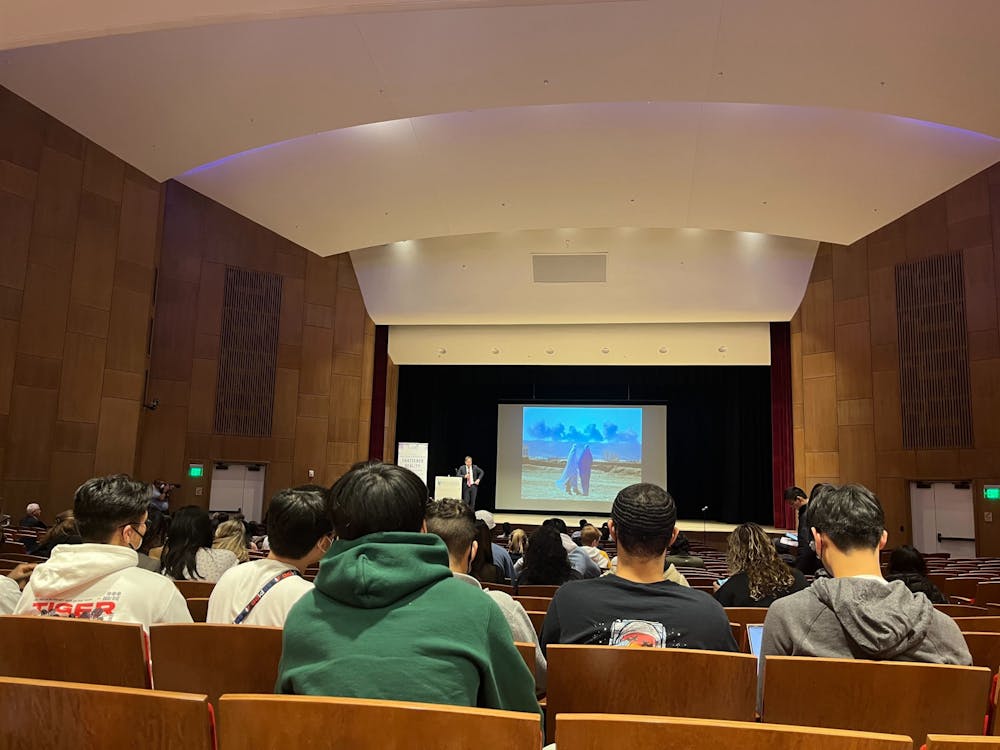The Foreign Affairs Symposium (FAS) hosted journalist Dexter Filkins. The event was held on March 10 and was the third event of six in this year’s “Shattered Reality: Reimagining the Future” speaker series.
As a correspondent for the New York Times and The New Yorker, Filkins has written extensively on U.S. intervention in the Middle East since 2000. He was part of a team of New York Times journalists that won a Pulitzer Prize for its coverage of Pakistan and Afghanistan in 2009.
In an email to The News-Letter, FAS Co-executive Director Maiss Mohamed explained how Filkins’ experiences and perspective added to this year’s symposium theme.
“Filkins fits well into our theme because he encourages us to think critically about the United States’ exit from Afghanistan and what could have improved the situation,” she wrote. “He emphasized how beautiful a country Afghanistan is with such a rich history and culture. This allowed our audience members to see a different picture of Afghanistan than simply what the media portrays it as, which is often a conflict zone.”
Filkins began his discussion by providing historical context for the U.S. military’s complete withdrawal from Afghanistan in August 2021. He traced U.S. involvement in Afghanistan from Sept. 11, 2001 to the 2020 Doha Agreement between the Trump administration and the Taliban, which initiated the withdrawal of U.S. forces, to the Biden administration’s announcement of Sept. 11, 2021 as the deadline for complete withdrawal.
Filkins evaluated the withdrawal in his talk.
“Whether or not we should have left at all, you can argue about that. There were reasonable arguments, I think, on each side,” he said. “What’s hard to deny is the way that we left. And the way that we left? It was not our finest hour. You probably saw the scenes on television; it was disgraceful.”
He also explained the withdrawal through the lens of personal anecdotes. He recounted the influx of calls he received from Afghans asking for help and the work he and colleagues did to charter a flight to evacuate a group of over 300 Afghans and Americans after it became clear the administration was not going to do so.
Member of the FAS programming committee Lucas Holloway appraised Filkins’ outlook in an email to The News-Letter.
“I was somewhat surprised by how brutally honest Filkins was about the war in Afghanistan and what went down in the recent U.S. withdrawal,” he wrote. “He certainly didn't pull any punches when talking about both the Biden and Trump regimes and made it crystal clear that the U.S. could have done a lot more at the end of the conflict to prevent tragedies that did occur last August.”
At one point in the talk, Filkins described the setting of a negotiation he attended.
“I went to the peace talks in late 2020 when Trump was still president. They were held in the Ritz Carlton and it was completely bizarre. You know they had this huge pool,“ he said. “And the Taliban guys were wandering around — and they’re men with turbans, and like the whole thing, and beards. And there’s like women walking around in bikinis; it was very nice...I mean talk about the clash of the century.”
In an email to The News-Letter, sophomore Yasmin Elmasry responded to this anecdote. For Elmasry, who was drawn to the symposium by her experience at Zeid Ra’ad Al Hussein’s event, the event did not go the way she expected.
“Audience members, especially those with a connection to this tragic war, do not come for an hour of anecdotes or stories about ‘women in bikinis’ being contrasted with ‘men in turbans,’ phrasing that in and of itself brings into question his integrity and ability to effectively talk about this war,” she wrote. “The hour lacked true insight into the hardships of the Afghan people and the complexities of war that journalism usually invokes.”
Sophomore Sophia Berkey, who attended the event, also discussed this part of Filkins’ talk in an email to The News-Letter.
“Filkins, despite his humanitarian work in Afghanistan, spoke about the country with great disrespect,” she wrote. “I would have hoped for a speaker to take an event like this more seriously.”
In an email to The News-Letter, Mohammed expressed appreciation for the feedback from the audience. She also addressed Elmasry and Berkey’s criticisms and pledged to be more mindful of future invited speakers.
In concluding his discussion, Filkins took time to relate the U.S. pullout from Afghanistan to broader trends in international politics, such as the Russian Federation’s recent invasion of Ukraine.
“I think we’re experiencing a collective recognition that when America disappears from the world, it’s not going to be peace and tranquility, it’s gonna be countries like Russia and China that are throwing their weight around,” he said. “The interesting thing [about the response to the invasion] is the way in which the U.S. and the rest of the Western democracies have woken up. Democracies are often really slow to respond, but once they do wake up, they’re pretty formidable.”





